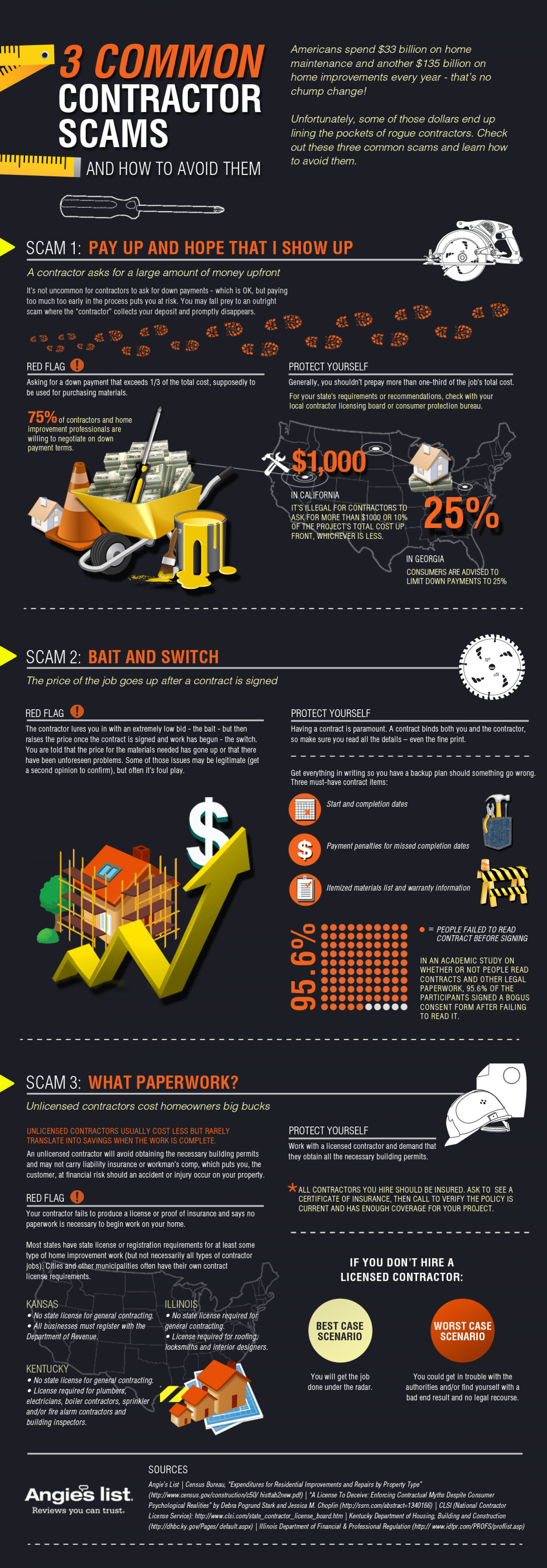
3 Common Contractor Scams
13 COMMON CONTRACTOR SCAMS Americans spend $33 billion on home maintenance and another $135 billion on home improvements every year - that's no chump change! Unfortunately, some of those dollars end up lining the pockets of rogue contractors. Check out these three common scams and learn how to avoid them. AND HOW TO AVOID THEM SCAM 1: PAY UP AND HOPE THAT I SHOW UP A contractor asks for a large amount of money upfront It's not uncommon for contractors to ask for down payments - which is OK, but paying too much too early in the process puts you at risk. You may fall prey to an outright scam where the "contractor" collects your deposit and promptly disappears. RED FLAG PROTECT YOURSELF Asking for a down payment that exceeds 1/3 of the total cost, supposedly to be used for purchasing materials. Generally, you shouldn't prepay more than one-third of the job's total cost. For your state's requirements or recommendations, check with your local contractor licensing board or consumer protection bureau. 75% of contractors and home improvement professionals are willing to negotiate on down payment terms. *$1000 ÎN CALIFORNIA IT'S ILLEGAL FOR CONTRACTORS TO ASK FOR MORE THAN $1000 OR 10% OF THE PROJECT'S TOTAL COST UP FRONT, WHICHEVER IS LESS. 25% IN GEORGIA CONSUMERS ARE ADVISĒD TO LIMIT DOWN PAYMENTS TO 25% SCAM 2: BAIT AND SWITCH The price of the job goes up after a contract is signed RED FLAG PROTECT YOURSELF The contractor lures you in with an extremely low bid - the bait - but then raises the price once the contract is signed and work has begun - the switch. You are told that the price for the materials needed has gone up or that there have been unforeseen problems. Some of those issues may be legitimate (get a second opinion to confirm), but often it's foul play. Having a contract is paramount. A contract binds both you and the contractor, so make sure you read all the details – even the fine print. Get everything in writing so you have a backup plan should something Three must-have contract items: wrong. Start and completion dates Payment penalties for missed completion dates Itemized materials list and warranty information • = PEOPLE FAILED TO READ CONTRACT BEFORE SIGNING IN AN ACADEMIC STUDY ON WHETHER OR NOT PEOPLE READ CONTRACTS AND OTHER LEGAL PAPERWORK, 95.6% OF THE PARTICIPANTS SIGNED A BOGUS CONSENT FORM AFTER FAILING TO READ IT. SCAM 3: WHAT PAPERWORK? Unlicensed contractors cost homeowners big bucks UNLICENSED CONTRACTORS USUALLY COST LESS BUT RARELY PROTECT YOURSELF TRANSLATE INTO SAVINGS WHEN THE WORK IS COMPLETE. Work with a licensed contractor and demand that An unlicensed contractor will avoid obtaining the necessary building permits and may not carry liability insurance or workman's comp, which puts you, the customer, at financial risk should an accident or injury occur on your property. they obtain all the necessary building permits. * ALL CONTRACTORS YOU HIRE SHOULD BE INSURED. ASK TO SEE A CERTIFICATE OF INSURANCE, THEN CALL TO VERIFY THE POLICY IS RED FLAG CURRENT AND HAS ENOUGH COVERAGE FOR YOUR PROJECT. Your contractor fails to produce a license or proof of insurance and says no paperwork is necessary to begin work on your home. Most states have state license or registration requirements for at least some type of home improvement work (but not necessarily all types of contractor jobs). Cities and other municipalities often have their own contract license requirements. IF YOU DON'T HIRE A LICENSED CONTRACTOR: ILLINOIS • No state license required for general contracting. License required for roofing, locksmiths and interior designers. KANSAS • No state license for general contracting. • All businesses must register with the Department of Revenue. BEST CASE SCENARIO WORST CASE SCENARIO KENTUCKÝ • No state license for general contracting. • License required for plumbers, electricians, boiler contractors, sprinkler and/or fire alarm contractors and You will get the job You could get in trouble with the authorities and/or find yourself with a done under the radar. bad end result and no legal recourse. building inspectors. SOURCES Angie's List | Census Bureau, “Expenditures for Residential Improvements and Repairs by Property Type" Angie's list. (htp://www.census.gov/construction/c50/ histtab2new.pdif) | *"A License To Deceive: Enforcing Contractual Myths Despite Consumer Psychological Realities" by Debra Pogrund Stark and Jessica M. Choplin (http://ssrn.com/abstract=1340166) | CLSI (National Contractor License Service): http://www.clsi.com/state_contractor_license_board.htm | Kentucky Department of Housing, Building and Construction (http://dhbc.ky.gov/Pages/ default.aspx) | Illinois Department of Financial & Professional Regulation (http://www.idfpr.com/PROFS/proflist.asp) Reviews you can trust. %24 95.6%
3 Common Contractor Scams
Source
http://www.a...d-them.htmCategory
HomeGet a Quote
